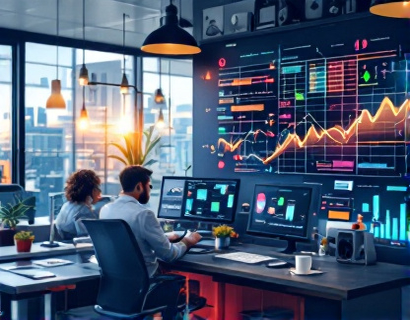Optimizing Restaurant Operations with Specialized Management Software
In the competitive world of dining, restaurant owners and managers face numerous challenges daily, from managing staff schedules and inventory to ensuring seamless customer service. Specialized management software has emerged as a game-changer, offering tailored solutions to streamline operations and enhance customer interactions. This comprehensive guide delves into how such software can transform the way restaurants function, providing insights and strategies to optimize performance and elevate the dining experience.
Understanding the Need for Specialized Management Software
The restaurant industry is characterized by high operational complexity and the need for precise coordination. Traditional management methods often fall short in addressing the unique demands of a restaurant environment. Specialized management software is designed to bridge these gaps by offering features and functionalities specifically tailored to the needs of restaurant owners and managers. These tools help in refining workflows, improving staff communication, and ultimately delivering exceptional dining experiences.
Streamlining Internal Operations
One of the primary benefits of specialized management software is its ability to streamline internal operations. Restaurant operations involve a multitude of tasks, from order taking and kitchen preparation to billing and customer service. Here are some key areas where software can make a significant impact:
1. Order Management and Kitchen Display Systems
Order management systems integrated with kitchen display systems (KDS) ensure that orders are accurately captured and efficiently communicated to the kitchen staff. This reduces errors, speeds up service, and enhances overall customer satisfaction. The software can track order status in real-time, allowing managers to monitor progress and address any issues promptly.
2. Inventory Management
Effective inventory management is crucial for maintaining profitability. Specialized software provides tools to track stock levels, monitor usage, and automate reordering processes. This helps in reducing waste, optimizing stock levels, and ensuring that popular items are always in stock. Some systems even offer predictive analytics to forecast demand and adjust inventory accordingly.
3. Staff Scheduling and Time Management
Managing staff schedules and shifts can be a complex task, especially for restaurants with fluctuating customer traffic. Management software offers advanced scheduling tools that consider historical data, employee availability, and legal working hour restrictions. This ensures optimal staffing levels, reduces overtime costs, and improves employee satisfaction. Additionally, time clock functions within the software streamline payroll processes and provide accurate time records.
Enhancing Customer Interactions
Customer interactions are a critical component of the dining experience. Specialized management software can significantly enhance these interactions through various features:
1. Customer Relationship Management (CRM)
CRM tools integrated into management software help restaurants build and maintain strong relationships with customers. These systems store customer information, purchase history, and preferences, enabling personalized service and targeted marketing efforts. For instance, staff can use customer data to recommend dishes or offer special promotions, creating a more memorable dining experience.
2. Online Reservation and Waitlist Management
With the rise of online booking platforms, managing reservations and waitlists efficiently is essential. Specialized software provides seamless integration with popular reservation systems, allowing customers to book tables easily. Managers can monitor waitlist status in real-time, send automated confirmation and reminder messages, and optimize table utilization to maximize revenue.
3. Feedback and Review Management
Customer feedback and reviews play a vital role in shaping the reputation of a restaurant. Management software can integrate with review platforms to collect and manage feedback directly within the system. This allows owners and managers to respond promptly to both positive and negative reviews, demonstrating a commitment to customer satisfaction and continuous improvement.
Improving Efficiency and Productivity
Efficiency and productivity are key drivers of success in the restaurant industry. Specialized management software contributes to these goals in several ways:
1. Automation of Repetitive Tasks
Automating routine tasks such as data entry, report generation, and routine notifications frees up staff to focus on more value-added activities. This not only increases productivity but also reduces the likelihood of human errors, ensuring higher accuracy in operations.
2. Real-Time Data and Analytics
Access to real-time data and advanced analytics is a powerful asset for restaurant managers. Software provides insights into key performance indicators (KPIs) such as sales trends, customer behavior, and operational efficiency. These insights enable data-driven decision-making, helping managers to identify areas for improvement and implement strategic changes.
3. Cross-Department Collaboration
Specialized management software fosters better collaboration across different departments within a restaurant. From the front-of-house to the back-of-house, all teams can access the same information and communicate more effectively. This alignment ensures that everyone is working towards the same goals, reducing misunderstandings and improving overall performance.
Enhancing External Customer Interactions
While internal operations are crucial, the customer experience extends beyond the restaurant's walls. Specialized management software also offers tools to enhance external customer interactions:
1. Mobile Ordering and Delivery Integration
With the growing popularity of mobile ordering and delivery services, integrating these platforms with restaurant management software is essential. This integration allows customers to place orders seamlessly through their preferred apps, and the software ensures that orders are accurately processed and fulfilled. Real-time updates and notifications keep customers informed throughout the process.
2. Loyalty Programs
Loyalty programs are an effective way to retain customers and encourage repeat visits. Management software can facilitate the creation and management of loyalty programs, tracking customer rewards and offering personalized incentives. This not only enhances customer satisfaction but also drives additional revenue through increased sales.
3. Online Menu Management
An up-to-date and visually appealing online menu is crucial for attracting and retaining customers. Specialized software allows restaurant owners to manage their menus digitally, making it easy to update prices, descriptions, and images. This ensures that the online menu always reflects the current offerings, reducing confusion and enhancing the customer experience.
Conclusion
Specialized management software is a transformative tool for restaurant owners and managers looking to optimize operations and enhance customer interactions. By streamlining internal processes, improving staff communication, and providing powerful customer-facing features, this software helps restaurants achieve top-notch efficiency and satisfaction. As the industry continues to evolve, embracing such technologies will be essential for staying competitive and thriving in a dynamic market.



